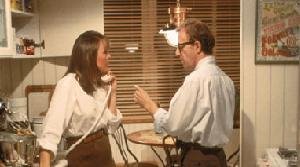
Manhattan Murder Mystery (Woody Allen, 1983)
The script to Woody Allen's Academy Award Best Picture-winning Annie Hall (1977) was supposed to have a sideplot involving a murder mystery, but that never materialized in the final film. That sideplot would materialize a decade or so later as the central plot of Woody Allen's aptly titled film, Manhattan Murder Mystery. Manhattan Murder Mystery also features a reteam-up of Allen and actress Diane Keaton, as a couple who lives in an apartment building where a supposed perfect murder took place in the apartment just beside theirs. The team-up between Allen and Keaton surfaced when Allen and his ex-wife, and frequent lead actress in his films, Mia Farrow are currently in a custody battle after a disastrous divorce.
It can be said that Manhattan Murder Mystery is one of those films that are products of an auteur's unfortunate personal incident (very much like David Cronenberg's The Brood (1979) where we find the Canadian director balancing his personal aches and the very personal approach to the horror film). However, Allen seems to be rather disinterested with his personal stuff while doing Manhattan Murder Mystery as the film is quite oddly cheerful and features a couple surviving the trials of a boring marriage intact until the end.
The couple, Larry (Allen) and Carol (Diane) Lipton live in an apartment beside that of a suspicious philatelist Paul House (Jerry Adler) and his sweet wife. One night, they discover that Paul's wife died of cardiac arrest, which is highly unlikely as the wife maintains a healthy lifestyle despite her sweet tooth. This leads to Carol investigating Paul's actions and discovering a likely conspiracy involving Paul, his actress lover, his wife's twin sister, and his movie theater's crippled manager. Of course, Larry disapproves of Carol's intrepid investigations as he just wants a normal, though boring to the brink of dissolution, marriage. However, ideas of Carol falling for his recently divorced friend Ted (Alan Alda) force Larry to get into the mystery as well.
The beginning and the middle of Manhattan Murder Mystery didn't give good signals for the Allen film. It was restless, talky, and quite banal. It features Larry and Carol, who are most of the time arguing about Carol's involvement with the investigation that might not even go anywhere, switching back and forth, from life's banalities. It's quite unhealthy and one can almost feel Allen's angst with his recent divorce with Mia Farrow in the frequent conversations between the film's couple. Brian di Palma's cinematography is rather loose, and doesn't help to liven the tired commentaries on married life vis-a-vis the murder mystery.
Also, Allen and Keaton's chemistry seems to have laxed over the years. It's probably due to the fact that Allen had such a good time with high-pitched lovely actress Farrow, that it took a while for Allen to finally revive the beautiful chemistry between him and Keaton. Keaton seems to be out-of-character most of the time, her energetic and hyperactive performance seems to overshadow Allen's more reserved acting, which is quite uncomfortable to watch as one has acquired the taste for Allen's neurotic tics taking over the film, rather than have a poorly underwritten female character boisterously squeak about things that might or might not have happened.
The film is salvaged when the actual mystery ensues. Once Allen gets to his groove and starts throwing witty jokes about his inadequacy, it suddenly looks brighter for the film. The actual murder mystery is mostly a hodgepodge of different films. There's a lot of Allen giving tributes to his favorite noirs: there's a scene where Allen and Keaton are watching Double Indemnity (Billy Wilder, 1944), a bus where a Mrs. Hous look-a-like appears features a sign for Vertigo (Alfred Hitchcock, 1957), The climactic ending seems to have been borrowed from Orson Welles' The Lady from Shanghai (1947). One can actually say that the entire film is Allen trying to figure himself and his directing style over the very stylistic yet highly combustible genre. It almost works, but Allen's lack of visual control over his film and his need to figure Manhattan neurosis into all of his works turn the film into simply a tribute to the genre, rather than a genre piece itself. It's still indelibly a Woody Allen film --- still drably shot, aptly scored, inconsistently edited, purposefully acted, and more importantly, still a lot of fun.







wm.jpg)

























.jpeg)





No comments:
Post a Comment